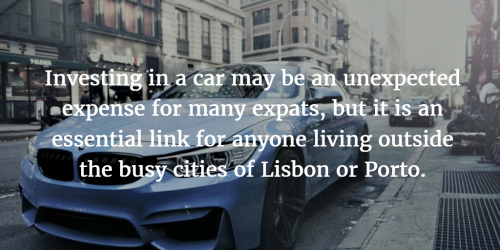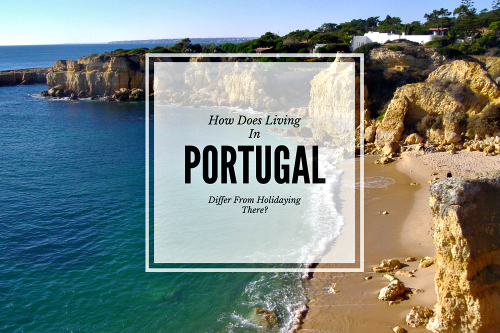Clinging onto Spain on the Iberian Peninsula, facing the vast expanse of the Atlantic, Portugal is often forgotten about, a small country with a smaller economy.
This wasn’t always the case. Portugal had a mighty empire that stretched across oceans and gave the kingdom a foothold in Asia, Africa and South America. Where Portuguese traders used to roam the world for spices and silk, it seems that Portugal now faces significant return traffic.The country’s warm climate and expansive coastline make is an attractive place for sun-seeking tourists to escape from greyer, colder northern European countries. As tourists flood into the Algarve resorts to sip cocktails, play golf and lie roasting in the sun, a few elect to stay.
Seduced by the sunshine, friendly locals and cheap cost of living, many visitors become expats, hunting down their ideal home for a life of fun in the sun. Brits especially are attracted to the country, thanks to English being a common second language and favourable terms offered to British pensioners in Portugal.
It’s not unusual to find businesses in the tourist hotspots flying the Union Jack, both to attract British holidaymakers and to boast the owner’s provenance to fellow UK expats.
Even away from the sun loungers and flip flops of the tourist traps, expats find a network of fellow exiles with whom to network. That’s not to say the locals won’t also extend a warm welcome.
The Portuguese are generally friendly to foreign visitors, especially those who make the effort to learn a little of the language. As a society the country is relaxed, open and liberal, permitting gay marriage and decriminalizing recreational drugs.
But before packing your bags for Portugal, read on. As with almost every country, visiting on holiday is very different from committing to a life overseas. We’ve compiled a breakdown of the top issues expats have to confront while tourists sunbathe on the beach
Housing
As with most European countries, housing stock varies across Portugal. You can find a beachside villa, a glittering penthouse, a classic townhouse or a rambling farmstead complete with paddocks.
Compared to the UK, house prices are cheap, but cost and quality can vary greatly. In the popular tourist spots, even the smallest apartment can be eye-wateringly expensive as bidders compete with those looking for holiday homes.
Consider carefully whether you can take on the property. There’s always the temptation to snap up a bargain and transform it into a designer residence. This is a difficult project in any country, but attempting this across language barriers or time zones can be impossible.

Be careful too when offered a farmstead complete with a parcel of land. It’s a lot of work to keep the buildings and land in working order; your relaxing retirement could suddenly be filled with long days of hard labour.
It’s a smart move to rent a place in Portugal and test-drive the neighbourhood for six months to a year before committing to life in one place. Rent is competitively cheap and lets you concentrate on settling into your new lifestyle rather than redecorating.
Hiring a Portuguese solicitor is a wise move, they can protect you from dodgy estate agents and guide you through the complicated process. Make sure that they check up on any contractors working on the house as well as tracking down the property’s habitation licence and setting you up with a tax number.
What will you do with your spare time?
Portugal is a very family orientated country, and whilst working hours are manageable there is an expectation that free time will be spent at home with your nearest and dearest.
Boredom can be a problem outside of the bigger towns. Expats report a lack of options for entertainment; whilst many went seeking a quiet life, they end up finding themselves struck by boredom.
Lisbon and Porto offer beaches, nightclubs, historical sights, restaurants and small cultural scenes. But away from the busy towns you may find yourself whiling away the hours by staring at the walls.
Carole Hill told expatsblog.com, “Where we live there are no Art Classes, Writing or Wine Circles, Gardening or Slimming Clubs or even Gyms!” She notes that these activities aren’t always available in smaller communities: “some of these are available but not locally.”
Portugal is famous for its golf courses, so expats who aren’t already handy with a club often take up the sport as a way to meet people. Others join Portuguese classes at local schools, these schemes are usually cheap or free and provide an introduction to the language for new arrivals.
Taxes
Most money matters in Portugal are fairly straightforward. Setting up a bank account, using credit cards and transferring money shouldn’t be cause for any major concern. Portugal’s status as a Euro currency nation also helps to simplify many transactions.
Expats should be aware, however, of their tax status. Residents who spend more than 183 days a year in the country face taxes against their global income. Portuguese employers will automatically deduct a cut from your pay cheque each month at a rate from 10.5% to 42%.
Most nationalities enjoy treaties that mean they are only charged one lot of taxes on their income. It’s important to work this out ahead of time or you could face a sucker punch of charges and fees for late payment of taxes.
Pension
Much like knowing if your country offers tax treaties, look into what similar agreements can mean for your pension.
Many of those pitching up in Portugal are looking to spend their sunset years relaxing in the sun. But they can find themselves facing a financial fright if their pensions are taxed, reduced or denied altogether.
In 2009, Portugal introduced a scheme that would give residents 10 years’ grace on foreign income. This means that those living in the country but receiving income from a pension back home could enjoy a decade without paying a single penny in tax on that cash. After this amnesty period finishes, the income will be included in your taxable income as if it were Portuguese money.
Getting around
The rail network in Portugal is sparse and unreliable. Whilst buses connect most of the big cities, it can be difficult to reach smaller settlements by public transport.
Investing in a car may be an unexpected expense for many expats, but it is an essential link for anyone living outside the busy cities of Lisbon or Porto. From shopping for groceries to dropping the kids at school or keeping a hospital appointment, a car will be a major help.

Portugal, with help from the EU, has invested heavily in a modern network of motorways. These slick tarmac highways are rarely travelled by motorists and offer the quickest route across the country. Some of these roads are subject to a toll fare, which can begin to add up over time.
Healthcare
Portugal provides healthcare for all, a state-funded system of hospitals and medical services that are ranked among the best in the world.
Having said that, the system is made up of several complicated and occasionally contradictory schemes. The Serviço Nacional de Saúde (SNS) is the catch-all term for these various initiatives.
The system covers everyone and is funded through taxes and national insurance, but has recently had to introduce fees for certain services. Life-saving drugs are heavily discounted, but other treatments may be subject to hefty fees. Carole Hill writing for expatsblog.com said, “unlike [in] the UK where you pay a set amount per item regardless of cost, in Portugal you pay for each medicine based on cost. For example, recently I was prescribed a medicine which cost me €55.00!”
Expats with ongoing health issues large or small should consider this extra expense and also shop around for the second option in Portuguese healthcare, private insurance. Again, these schemes can be complicated, with some return payments to customers.
The third scheme is unlikely to apply to expats. There are health subsystems in place for those employed by the military, emergency services or government departments. These can be expanded to cover dependents for a low cost.
In addition to knowing your insurance status, consider the location in which you live. Portuguese hospitals are categorized into four groups, each offering different services.
Group one hospitals cover areas with a population of at least, 75,000 people, offering emergency services as well as most common surgical and medical services. If living in the countryside you may find yourself travelling a long way to access the most basic of care. For more serious conditions, you may need to travel right across the country.
Although it is highly regarded, there are tales of things going wrong in Portugal’s healthcare system. Sirtravelot told expatforum.com, “My mother was in a car accident in Portugal. In hospital they gave her a shot and put her out the door. Three weeks later her Scottish doctor came to our house because I was very sick and diagnosed my mom with a broken leg – without any need of diagnostic tools.”
Red tape
Getting anything done in Portugal requires a swim through a sea of red tape. Swathes of forms, quite often replicating information, will be required by a number of government departments, who will then need signatures, stamps and photocopies from other departments before allowing you to continue.
It’s fair to say that this is the case in many countries, but Portugal also enjoys a slow pace of life, meaning piles of paperwork progress slowly. You may also encounter staff who seem more interested in getting rid of you than progressing your documents.
Where possible hire a Portuguese professional to handle accounts, licences and anything else that needs an expert touch.
Not as cheap as you may expect
Yes, Portugal is cheaper than much of Europe, but not as cheap as it once was.
When the credit crunch hit, Portugal initiated an austerity campaign that saw an increase in various taxes and a decrease in funding and subsidies. Consequently, the Portuguese now pay a lot more on a wide range of goods.
Specific items like cars and furniture are inexplicably expensive and it may be worth purchasing them from another European country and shipping them in.
As a rule of thumb, most prices in Portugal for products, rent and mortgage repayments are half those of the UK. Of course, the average income in Portugal is also much reduced, meaning the final total gives a British worker almost three times the cash in his pocket at the end of the month.
Finding work can be a full-time job
In theory it is easy for any EU resident to turn up in Portugal and begin applying for jobs. The Schengen agreement means any resident from the EU community has the right to move freely between countries, living and working wherever they choose.
In practice, it’s quite a gamble to turn up in Portugal and just start looking for a salary. The country was hit hard by the 2008 recession and needed bailing out of a fiscal black hole. Although no longer teetering on the edge, Portugal’s economy is still a long way off booming.
Unemployment is still high at 13% and economic growth is sluggish. Much of the nation’s productivity is geared toward manufacturing, meaning the demand for unskilled and semi-skilled labour is higher than for skilled labour.
Having said this, things are changing. There is a slow but determined shift towards a high-tech development sector, which potentially could employ a large number of skilled expats from around the world.

Even if you find a job that suits you perfectly, you may still be at a disadvantage over Portuguese candidates. Much of the business culture in the country relies on trust, companies are likely to stick with the same suppliers for years, and jobs are usually won on a recommendation from a friend.
This can also be a limiting factor for those wanting to set up their own business or work as a freelancer. Expats sometimes set up businesses aimed at fellow expats, but anyone looking to sell to the locals may find it easier to partner up with a local.
Setting up a business in Portugal requires a lot of paperwork, so visit the local financas office, where a government official can advise you on the process of starting out.
Location, Location, Location!
Portugal is a great place from which to explore the rest of Europe as discount airlines shuttle holiday-makers back and forth.
But within the country there is a great range of places to live, from the cobbled streets of old Lisbon to the rugged foothills to north. In the Algarve you are going to be surrounded by the bustle of the tourist trade, whilst the northern part of the country is quieter and friendlier, but considerably poorer.
Wherever you intend to live, make sure you can get the services and support that you need.
Have you lived in Portugal? Do you have any tips for fellow expats? Let us know in the comments!
Article by Andy Scofield, Expat Focus International Features Writer

